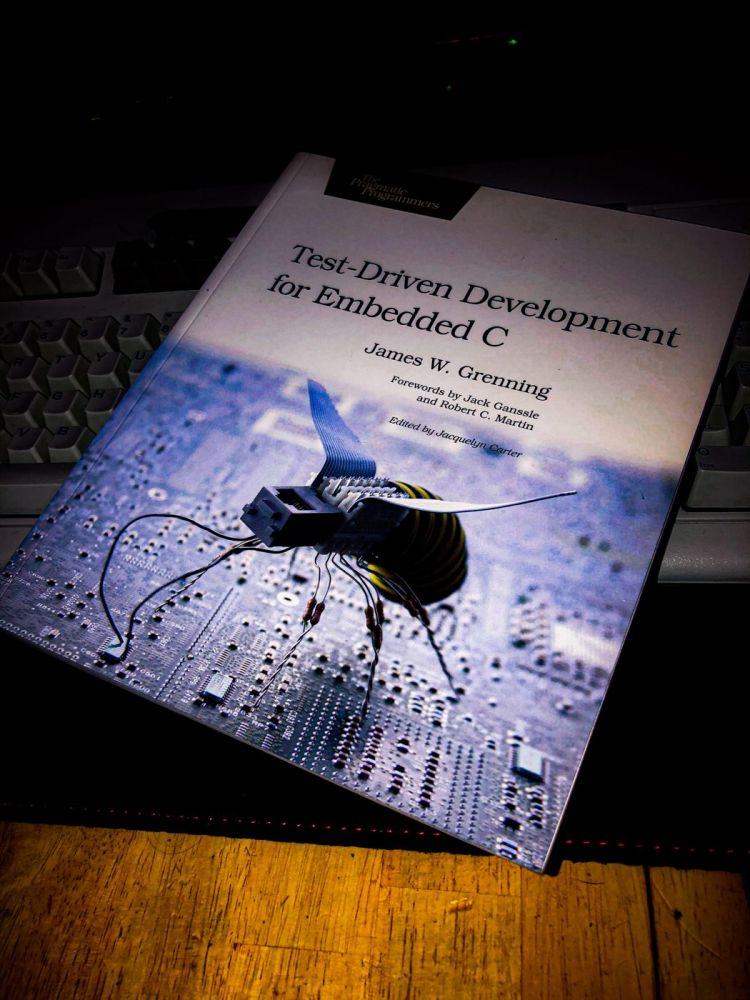Ranter
Join devRant
Do all the things like
++ or -- rants, post your own rants, comment on others' rants and build your customized dev avatar
Sign Up
Pipeless API

From the creators of devRant, Pipeless lets you power real-time personalized recommendations and activity feeds using a simple API
Learn More
Comments
-
Yet, I catch nothing but flak when I say digital electronics and csa should be the first thing taught 😝
-
@SortOfTested ohh geese yes lmfao... I see CSA.. and I think control system advisor.. that’s the only time I see that acronym used lol
-
 Bubbles64785yHow does one simply build their own computer and learn all this. I’m pissed that the world has been holding out on me
Bubbles64785yHow does one simply build their own computer and learn all this. I’m pissed that the world has been holding out on me -
@Bubbles I think your confusion may be attributed to your definition of a “computer”.. the book is not referring to computer in the consumer electronics PC sense of the word computer.
The definition is referring to the pure basic abstract sense of the word computer being a device that carries out sequences of operations via programming.
And programming in the sense of machine code. 1s and 0s -
@Demolishun I don’t disagree but sitting a person down, who doesn’t understand logic gates and machine code and all that would not understand or atleast have large learning curve to just go straight to FPGAs..
-
 Bubbles64785y@QuanticoCEO no I know which “computer” definition was being used, I’m on the same page as you don’t worry
Bubbles64785y@QuanticoCEO no I know which “computer” definition was being used, I’m on the same page as you don’t worry -
@Bubbles @Demolishun
I think the best explanation I and others and the book is referring to when “building your own computer from scratch” is referring to something of the nature of The following videos
https://youtube.com/playlist/...
OR
https://youtube.com/playlist/... -
@SortOfTested because bottom-up isn't the only way to teach, top-down is far more goals driven and lets you see very easily why you're doing whatever you're doing.
Of course most places go for a mix of the two. -
@Bubbles nice!! Lmfaoo, I was actually in the process of acquiring those to follow those videos as a side project. And then move to a xylinx fpga afterwards myself
-
@RememberMe
It is, however, the best way to make products that aren't unmaintainable trash. A university that teaches task-oriented learning over fundamentals isn't a university -
@SortOfTested I'm talking about teaching, not development. I agree with you on development.
-
@RememberMe
I feel that for teaching as well, hence the edit. One begets the other. -
@RememberMe I disagree, top down is not always the correct approach, sure you get high level understanding but you must go under the hood, you must go down the rabbit hole of understanding from the bottom up to see the big picture.. top down misses sooo much, because going from the top down how do you know where and what to venture further into? How do you know what you don’t know enough about?.. from the high level all is theoretical and from that point why know the details... which is why soo many PHD fucks suck at practical shit, because it’s all high level understanding of most ideal cases.
Start at the bottom get a great foundation.. and build .. build and build and build and build and build on top of that foundation.. and continue before you know it you have a fortress of knowledge and understanding of everything to that point because you built it from the bottom up...
Top down, it’s like okay I acquired this information, I did not experience I do not know how far it goes down.. I do not know what it takes to actually do this, how can I optimize this because my understand is only high level.
See the difference??
Low level, the knowledge is there and the understanding is solid... because it was build upon..
High level is like cheat codes, like starting a video game and going straight to enabling god mode cheat of the video game, but not understanding anything, you have all this power but it’s unless and pointless without context.
Idk how else to explain it lol -
@SortOfTested to reply to the edit - I fully support teaching systems, architecture, digital logic, electronics, formal logic, theory of computation and so on. It's the "first thing taught" bit that I don't agree with. Start people off with getting programming experience in C/SML/whatever instead, then peel back the layers.
-
@Bubbles I have some slight advantages due to my low level programming experience but I am not an Electrical engineer so I will have a slight handicap as would most
-
@QuanticoCEO
I usually just say, "if at any point your education asks you to accept something as magic, you should be asking for a refund."
Jacking up the frame to pour the foundation doesn't bode well for your house's structural longevity. -
@Demolishun
In regards to comparability you can round to contextually relevant scales or apply statistical groups. -
@Demolishun I think you might like this channel in case you have not seen it already.
If we had talked about this one before I apologize.
https://youtube.com/watch/...
Related Rants
-
 QuanticoCEO32
QuanticoCEO32 From the guy who wrote all the Programming Microsoft books and the Annotated Turing book. Comes this book.
Th...
From the guy who wrote all the Programming Microsoft books and the Annotated Turing book. Comes this book.
Th... -
 QuanticoCEO7
QuanticoCEO7 Working in the embedded systems industry for most of my life, I can tell you methodical testing by the softwar...
Working in the embedded systems industry for most of my life, I can tell you methodical testing by the softwar... -
 QuanticoCEO21
QuanticoCEO21 From NAND to Tetris..
This book is IMO the best book for those who want to venture to the lower level program...
From NAND to Tetris..
This book is IMO the best book for those who want to venture to the lower level program...

Forgot to post a book yesterday, so maybe I’ll post two books today...
Anyway, this book, I found it recently never seen it before. But boy is it great.
It’s similar to the programming pearls book as far as what it’s about. Think of the refactoring book, clean code, programming pearls, and the mythical man month books, thrown in a blender, added some new spice and some new things, and filtered down into 100 or so page book, simple quick and enjoyable actually.
This book the references staple books by Sedgwick, knuth, Brooks, Myers, and so many others. It’s funny how things come full circle.
My favorite quote from the book. I’ve been essentially saying this for years, but to see it on a book, it’s lovely... more people need to realize it too.
“Understanding how things work at a low level becomes a base for making good decisions at the high level”
Followed up with if you’ve never built a computer from scratch your missing out... get yourself a breadboard and some TTL logic.. and build a 4 bit CPU, once you know how to program in assembly the next step is building your own computer ... if your university didn’t teach a class that did this they ripped you off....
Don’t bitch at me.. the book said that.. and I agree! 100% because it’s true, you can’t debate that.
Oh and btw this is another book written by a female developer.. kudos to her for nailing so many topics in such a short book!
rant
bookaday